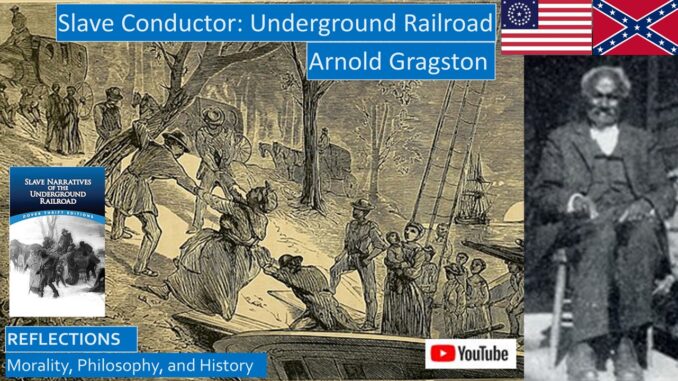
Arnold Gragston shares a fascinating account of how he helped hundreds of slaves escape to freedom across the Ohio River while he himself remained enslaved. This makes him one of the rare slave conductors of the Underground Railroad.
As he put it, he guessed he “could be called a ‘conductor’ on the underground railway, only we didn’t call it that then. I don’t know as we called it anything. We just knew there was a lot of slaves always a-wanting to get free, and I had to help them.”
As is often common, there are just a few photographs of Arnold Gragston, so we will use illustrations from Frederick Douglass’ slave biography and Uncle Tom’s Cabin, as well as other illustrations in this reflection.
ARNOLD GRAGSTON’S LIFE AS A SLAVE
Arnold Gragston begins: “Most of the slaves didn’t know when they was born, but I did. You see, I was born on a Christmas morning—it was in 1840; I was a full-grown man when I finally got my freedom.”
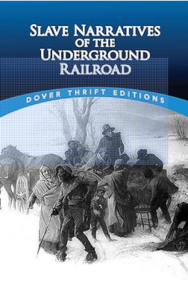
“Before I got it, though, I helped a lot of others get theirs. Lawd only knows how many; might have been as much as two-three hundred. It was ‘way more than a hundred, I know.”
“But that all came after I was a young man—’grown’ enough to know a pretty girl when I saw one, and to go chasing after her, too. I was born on a plantation that belong to Mr Jack Tabb in Mason County, just across the river in Kentucky.”
Gragston remembers: “Mr Tabb was a pretty good man. He used to beat us, sure; but not nearly so much as others did, some of his own kin people, even. But he was kinda funny sometimes; he used to have a special slave who didn’t have nothing to do but teach the rest of us—we had about ten on the plantation, and a lot on the other plantations near us—how to read and write and figger. Mr Tabb liked us to know how to figger. But sometimes when he would send for us and we would be a long time coming, he would ask us where we had been. If we told him we had been learning to read, he would near beat the daylights out of us—after getting somebody to teach us; I think he did some of that so that the other owners wouldn’t say he was spoiling his slaves.”
Arnold’s master was actually breaking the law by teaching his slaves how to read. Many states passed these laws after slaveowners were spooked by the brutal Nat Turner slave rebellion in 1830XXX.
YT
“He was funny about us marrying, too. He would let us go a-courting on the other plantations near anytime we liked, if we were good, and if we found somebody we wanted to marry, and she was on a plantation that belonged to one of his kin folks or a friend, he would swap a slave so that the husband and wife could be together. Sometimes, when he couldn’t do this, he would let a slave work all day on his plantation and live with his wife at night on her plantation. Some of the other owners was always talking about his spoiling us.”
“He wasn’t a Dimmacrat like the rest of them in the country; he belonged to the ‘know-nothing party’ and he was a real leader in it. He used to always be making speeches, and sometimes his best friends wouldn’t be speaking to him for days at a time.”
Explain this difference
“Mr Tabb was always specially good to me. He used to let me go all about—I guess he had to; couldn’t get too much work out of me even when he kept me right under his eyes. I learned fast, too, and I think he kinda liked that. He used to call Dandy Davis, the slave who taught me, ‘the smartest Nigger in Kentucky.’”
BECOMING A SLAVE CONDUCTOR ON THE UNDERGROUND RAILROAD
“It was ’cause Mr Tabb used to let me go around in the day and night so much that I came to be the one who carried the running away slaves over the river. It was funny the way I started it, too. I didn’t have no idea of ever getting mixed up in any sort of business like that until one special night. I hadn’t even thought of rowing across the river myself.”
“But one night I had gone on another plantation courting, and the old woman whose house I went to told me she had a real pretty girl there who wanted to go across the river and I would take her? I was scared and backed out in a hurry. But then I saw the girl, and she was such a pretty little thing, brown-skinned and kinda rosy, and looking as scared as I was feeling, so it wasn’t long before I was listening to the old woman tell me when to take her and where to leave her on the other side.”
“I didn’t have nerve enough to do it that night, though, and I told them to wait for me until tomorrow night. All the next day I kept seeing Mister Tabb laying a rawhide across my back, or shooting me, and kept seeing that scared little brown girl back at the house, looking at me with her big eyes and asking me if I wouldn’t just row her across to Ripley. Me and Mr Tabb lost, and soon as dust settled that night, I was the old lady’s house.”
“I don’t know how I ever rowed the boat across the river the current was strong and I was trembling. I couldn’t see a thing there in the dark, but I felt that girl’s eyes. We didn’t dare to whisper, so I couldn’t tell her how sure I was that Mr Tabb or some of the other owners would ‘tear me up’ when they found out what I had done. I just knew they would find out.”
“I was worried, too, about where to put her out of the boat. I couldn’t ride her across the river all night, and I didn’t know a thing about the other side. I had heared a lot about it from the other slaves but I thought it was just about like Mason County, with slaves and masters, overseers and raw-hides; and so, I just knew that if I pulled the boat up and went to asking people where to take her I would get a beating or get killed.”
“I don’t know whether it seemed like a long time or a short time, now – it’s so long ago; I know it was a long time rowing there in the cold and worrying. But it was short, too, ’cause as soon as I did get on the other side the big-eyed, brown-skinned girl would be gone. Well, pretty soon I saw a tall light and I remembered that the old lady had told me about looking for that light and rowing to it. I did; and when I got up to it, two men reached down and grabbed her; I started trembling all over again and praying. Then, one of the men took my arm and I just felt down inside of me that the Lord had got ready for me. ‘You hungry, Boy?’ is what he asked me, and if he hadn’t been holding me I think I would have fell backward into the river.”
“That was my first trip; it took me a long time to get over my scared feeling, but I finally did, and I soon found myself going back across the river, with two and three people, and sometimes a whole boatload. I got so I used to make three and four trips a month. “
“What did my passengers look like? I can’t tell you any more about it than you can, and you wasn’t there. After that first girl—no, I never did see her again—I never saw any passengers. I would have to be the ‘black nights’ of the moon when I would carry them, and I would meet them out in the open or in a house without a single light. The only way I knew who they were was to ask them; “What you say?” And they would answer, “Menare.” I don’t know what that word meant—it came from the Bible. I only know that that was the password I used, and all of them that I took over told it to me before I took them.”
Even after freedom, even after the Civil War has ended, apparently our conductor Arnold Gragston still fears the possible consequences of breaking the Fugitive Slave Law, and does not want to admit he knew which neighbors he helped to freedom!
“I guess you should wonder what I did with them after I got them over the river. Well, there in Ripley was a man named Mr Rankins; I think the rest of his name was John.” “Mr Rankins had a regular ‘station’ for the slaves. He had a big lighthouse in his yard, about thirty feet high and he kept it burning all night. It always meant freedom for slave if he could get to this light.” “Sometimes Mr Rankins would have twenty or thirty slaves that had run away on his place at a time. It must have cost him a whole lots to keep and feed them, but I think some of his friends helped him.”
DESTINATION FOR RUNAWAY SLAVES
“You see, Ohio was a free state and once they got over the river from Kentucky or Virginia, Mr Rankins could strut them all around town, and nobody would bother them. The only reason we used to land them quietly at night was so that whoever brought them could go back for more, and because we had to be careful that none of the owners had followed us. Everyone in a while they would follow in boat and catch their slaves back. Sometimes they would shoot at whoever was trying to save the poor devils.”
“Those who wanted to stay around that part of Ohio could stay, but didn’t many of them do it; because there was too much danger that you would be walking along free one night, feel a hand over your mouth, and be back across the river and in slavery again in the morning. And nobody in the world ever got a chance to know as much misery as a slave that had escaped and been caught.”
“So a whole lot of them went on North to other parts of Ohio, or to New York, Chicago or Canda; Canda was popular because all the slaves thought it was the last gate before you got all the way inside of heaven. I don’t think there was much chance for a slave to make a living in Canda, but didn’t many of them come back. They seem like they rather starve up there in the cold than to be back in slavery.”
“The Army soon started taking a lot of them, too. They could enlist in the Union Army and get good wages, more food than they ever had, and have all the little gals waving at them when they passed. Them blue uniforms was a nice change, too.”
“No, I never got anything from a single one of the people I carried over the river to freedom. I didn’t want anything; after I had made a few trips I got to like it, and even though I could have been free any night myself, I figgered I wasn’t getting along so bad so I would stay on Mr Tabb’s place and help the others get free. I did it for four years.”
DID HIS MASTER SUSPECT HE WAS A SLAVE CONDUCTOR?
“I don’t know to this day how Mr Tabb never knew what I was doing; I used to take some awful chances, and he knew I must have been up to something; I wouldn’t do much work in the day, would never been in my house at night, and when he would happen to visit the plantation where I had said I was going and I wouldn’t be there. Sometimes I think he didn’t know and wanted me to get the slaves away that way so he wouldn’t have to cause hard feelings by freeing them.”
“I think Mr Tabb used to talk a lot to Mr John Fee; Mr Fee was a man who lived in Kentucky, but Lord! How that man hated slavery! He used to always tell us (we never let our owners see us listening to him, though) that God didn’t intend for some men to be free and some men to be in slavery. He used to talk to the owners, too, when they would listen to him, but mostly they hated the sight of John Fee.”
“In the night, though, he was a different man, for every slave who came through is place going across the river he had a good word, something to eat and some kind of rags, too, if it was cold. He always knew just what to tell you to do if anything went wrong, and sometimes I think he kept slaves there on his place ’till they could be rowed across the river. Helped us a lot.”
WHY AROLD GRAGSTON SOUGHT FREEDOM IN 1863
“I almost ran the business in the ground after I had been carrying the slaves across for nearly four years. It was in 1863, and one night I carried across about twelve on the same night. Somebody must have seen us, because they set out after me as soon as I steered out of the boat back on the Kentucky side; from that time on they were after me. Sometimes they would almost catch me; I had to run away from Mr Tabb’s plantation and live in the fields and in the woods. I didn’t know what a bed was from one week to another. I would sleep in a cornfield tonight, up in the branches of a tree tomorrow night, and buried in a hay pile the next night; the River, where I had carried so many across myself, was no good to me; it was watched too close.”
“Finally, I saw that I could never do any more good in Mason County, so I decided to take my freedom, too. I had a wife by this time, and one night we quietly slipped across and headed for Mr Rankings bell and light. It looked like we had to go almost to China to get across that river; I could hear the bell and see the light on Mr Rankings place, but the harder I rowed, the farther away it got, and I knew if I didn’t make it, I’d get killed. But finally, I pulled up by the lighthouse, and went on to my freedom—just a few months before all of the slaves got theirs. I went on to Detroit and still live there with most of ten children and thirty-one grandchildren.”
“The bigger ones don’t care so much about hearing it now, but the little ones never get tired of hearing how their grandpa bought Emancipation to loads of slaves he could touch and feel, but never could see.”
Why didn’t Arnold Gragston visit his old master after the Civil War had ended? Years after Emancipation, Frederick Douglass’ old master asked for him to call on him. His old master told him when he read in his books how his mother was being mistreated by a relative, he made sure she was taken care of better.
YT
DISCUSSING THE SOURCES
This verbatim interview with the ninety-seven-year-old ex-slave Arnold Gragston was the only account from our collection of XXXX
that drew from the Ex-Slave Narratives from the Federal Writers’ Project from 1936-1938. During the Depression, the WPA, or Works Progress Administration, hired painters to paint murals in post offices and other public buildings, and writers to record interviews of ex-slaves and other culturally enriching projects. These interviews are on the internet:

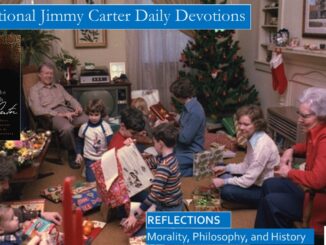
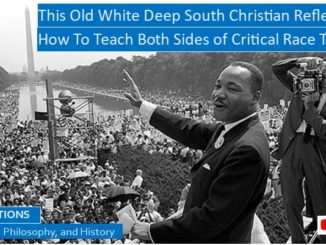
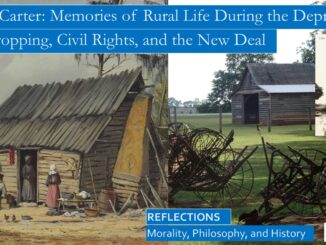
2 Trackbacks / Pingbacks